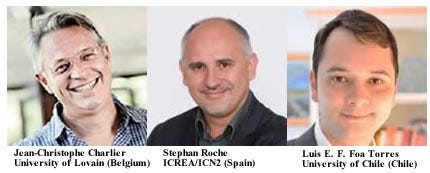Throughout 18 years working at the Phantoms Foundation (www.phantomsnet.net) organizing conferences, I have been able to meet great minds and exceptional people. I wanted to put in this post the book entitled "Introduction to graphene-based nanomaterials" because the 3 authors are, firstly, great scientists and secondly because I have been lucky enough to know each one of them personally. Throughout all these years I have been able to meet them several times at different conferences. One of those most important conferences for us is “Graphene International Conference” that we organize every year (the event in 2020 taked virtually for health reasons due to Covid19). This year 2021 (www.grapheneconf.com) we hope to be able to celebrate it in person again. It is scheduled for October and I will be able to meet again with the 3 scientists. Below you will find a brief description of each of them as well as a description of the content of the book and some links to buy it.
Description
Beginning with an introduction to carbon-based nanomaterials, their electronic properties, and general concepts in quantum transport, this detailed primer describes the most effective theoretical and computational methods and tools for simulating the electronic structure and transport properties of graphene-based systems. Transport concepts are clearly presented through simple models, enabling comparison with analytical treatments, and multiscale quantum transport methodologies are introduced and developed in a straightforward way, demonstrating a range of methods for tackling the modelling of defects and impurities in more complex graphene-based materials. The authors also discuss the practical applications of this revolutionary nanomaterial, contemporary challenges in theory and simulation, and long-term perspectives. Containing numerous problems for solution, real-life examples of current research, and accompanied online by further exercises, solutions and computational codes, this is the perfect introductory resource for graduate students and researchers in nanoscience and nanotechnology, condensed matter physics, materials science and nanoelectronics.
Jean-Christophe Charlier is Full Professor at the Universityof Louvain(UCL) in Belgium. He is Physics Engineer and Bachelor in Philosophy and got his PhD thesis in Applied Physics in 1994 at UCL.Prof. J.-C. Charlier is in charge of several lectures at UCL (Statistical Physics, Quantum Physics, Materials Science, Physics of Nanostructures, Atomistic Simulations, Quantum Transport in Nano-materials). The main scientific interests of Prof. J.-C. Charlier are centered on theoretical condensed matter physics and nanosciences,covering the areas of: electronic and structural properties of crystalsand reduced-dimensional solids; nanotubes, graphene and related carbon-based nanostructures; quantum transport through single molecules and other nanosystems. The objective is to explain and predict the properties of materials using first-principles theories and computational physics. He is author (or co-author) of about 150 scientific publications in high-impact peer-reviewed journals. In collaboration with two other colleagues, he wrote a book entitled “Introducing Graphene-based nanomaterials : from electronic structure to quantum transport” that was published by Cambridge University Press in 2014.
Prof. Stephan Roche is a theoretician with more than 25 years’ experience in the study of transport theory in low-dimensional systems, including graphene, carbon nanotubes, semiconducting nanowires, organic materials and topological insulators.
He has published more than 200 papers in journals such as the Review of Modern Physics, Nature Physics, Nano Letters and Physical Review Letters and he is the co-author of the book titled “Introduction to Graphene-Based Nanomaterials: From Electronic Structure to Quantum Transport” (Cambridge University Press, 2020-second edition). He received the qualification to supervise PhD students from the Université Joseph Fourier (Grenoble, France) in 2004, and since then he has supervised more than ten PhD students and about 25 postdoctoral researchers in France, Germany and Spain. In 2009 Prof. Roche was awarded the Friedrich Wilhelm Bessel Research Award by the Alexander Von-Humboldt Foundation (Germany) and, since 2011, he has been actively involved in the European Graphene Flagship project as deputy leader of the Spintronics Work Package (WP). He will serve as leader of this WP from April 2020 till March 2023, as well as Division leader of the Graphene Flagship.
Luis E. F. Foa Torres (b. 1978) is a condensed matter physicist. Since May 2016 he is an Associate Professor of Physics at the University of Chile (FCFM). Before he worked in Argentina as a Professor and CONICET Independent Research Scientist; in Germany as a fellow of the prestigious Alexander von Humboldt Foundation (TU Dresden) granted “in recognition of previous research work”; in France, at CEA-Grenoble; and in Italy, at the International Centre for Theoretical Physics in Trieste, first as a postdoctoral fellow and then as Associate of the Condensed Matter Section (2011-2016). His research is focused on quantum transport, two-dimensional materials (e.g. graphene), topological insulators and the physics of driven systems. Inelastic effects deriving from electron-phonon and electron-photon interactions (e. g. quantum pumping, Floquet topological states) occupy a central stage in his contributions. He has more than 45 publications in international journals and a book published by Cambridge University Press, which is both the oldest publishing house in the world and the oldest university press. These works have collected more than 1300 citations with h-index 22.
https://www.amazon.es/Introduction-Graphene-Based-Nanomaterials-Electronic-Structure/dp/1107030838





